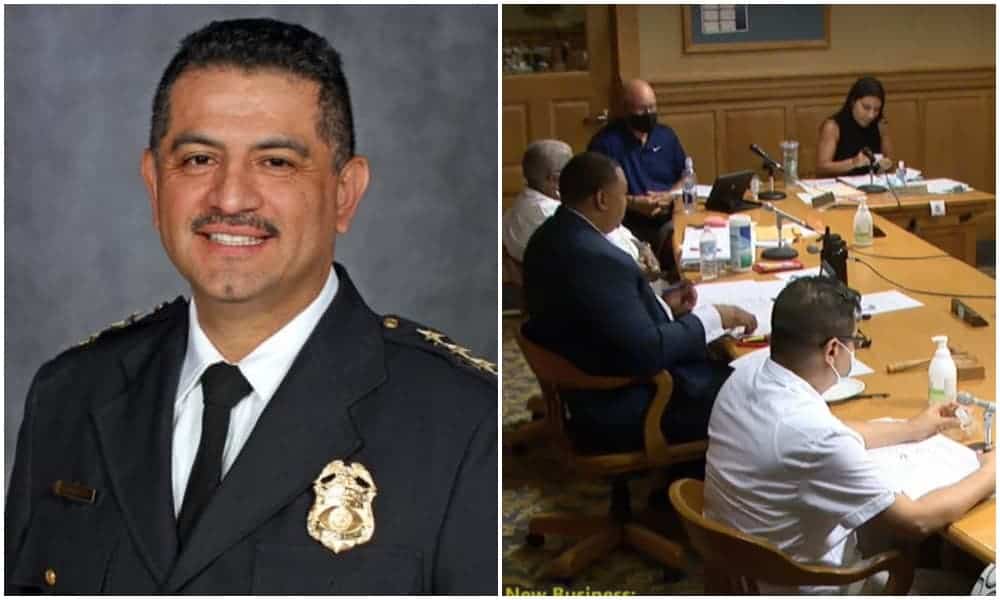On Friday, a judge ordered that Alfonso Morales, Milwaukee’s former police chief, should get his job back, saying the Fire and Police Commission subjected Morales to a “fundamentally flawed process.”
In the decision, Milwaukee County Circuit Judge Christopher Foley reversed the Milwaukee Fire and Police Commission’s decision to demote Chief Morales to captain. If the FPC still wants to demote Morales, they have to start at square one. Since Morales has retired, it’s not clear what will happen next. “It is clear this entire process was flawed,” Foley wrote in the decision.
“It was not properly initiated, depriving the petitioner of notice of the specific charges against him; no evidence was presented to support whatever those
charges may have been; he was not permitted to challenge any evidence in support of those charges by cross examination or presentation of his own witnesses or evidence; as noted below, even on this limited record, it is clear one of the tribunal members was not impartial; the tribunal failed to make findings as to what charges were sustained and justified the demotion. Disregard of the statutory and constitutional requirements attending this process pervaded it from beginning to end,” wrote the judge.
Read the full decision here.
The decision adds more uncertainty over the leadership of the Milwaukee Police Department; it came the day after the Milwaukee Fire and Police Commission selected a new acting police chief, Jeffrey Norman. The Commission remains deadlocked 3-3 between two candidates – FBI agent Hoyt Mahaley and Dallas Deputy Chief Malik Aziz in selecting a new chief. Meanwhile, the mayor’s nominee to the commission, who would break the deadline, is drawing controversy because she supports abolishing the police department.
When he filed suit, Morales alleged that the Milwaukee Fire and Police Commission “exhibited bias” against him, denied him due process, harmed his reputation, and breached his contract when it demoted Morales to captain on Aug. 6.
Michael Brunson has been serving as acting chief. Morales filed a lawsuit, and then asked for judicial review. Morales sued the city for $625,000 in lost pay and legal fees.
Foley reversed the FPC’s demotion decision, but he didn’t give additional instructions about what should be done next, citing the Commission’s own failures as an impediment to doing so.
“I acknowledge that from the City’s perspective there is great benefit in remand with directions,” he wrote. “Remand continues the status quo as of the conclusion of the Commission hearing with Mr. Morales demoted to captain and appealing that demotion. It avoids the potential, noted in media accounts, of ‘two chiefs.'”
He added, “But that is a potential dilemma of the Commission’s own making and wholly ignores the detrimental impact of the fundamentally flawed process on the interests of Mr. Morales. This record does not and cannot justify remand.”
According to the notice of claim filed by his attorney on Aug. 20, the Board “took disciplinary action against Morales adversely affecting his property and reputational interests without specific notice of the charges giving rise to disciplinary action taken against him, without just cause, and without due process of law. Morales was denied due process of law in that he was denied adequate notice, a fair hearing, and an opportunity to be heard.”
The Board “exhibited bias against Morales prior to the Aug. 6 meeting, including former Board President Steven DeVougas in both his written statement and press conference before the meeting on Aug. 6,” the claim says, adding that Morales was “denied a fair hearing before a neutral and unbiased tribunal and denied due process of law.”
On July 28, the city attorney told Milwaukee Mayor Tom Barrett that one of the directives the Board gave the chief would jeopardize “a settlement agreement resolving a federal civil rights case.” The city attorney, Tearman Spencer, urged Barrett to overrule the directive, but he did nothing, the notice says.
The Board’s actions caused him to be “subjected to public approbation and reputational harm, which will have substantial and serious consequences, including adversely impacting his ability to secure a similar position in law enforcement and, perhaps other executive or managerial employment.”







![WATCH: Elon Musk Town Hall Rally in Green Bay [FULL Video]](https://www.wisconsinrightnow.com/wp-content/uploads/2022/04/Elon_Musk_3018710552-265x198.jpg)



![The Great American Company [Up Against the Wall]](https://www.wisconsinrightnow.com/wp-content/uploads/2025/03/MixCollage-29-Mar-2025-09-08-PM-4504-265x198.jpg)
![The Wisconsin DOJ’s ‘Unlawful’ Lawman [WRN Voices] josh kaul](https://www.wisconsinrightnow.com/wp-content/uploads/2025/03/MixCollage-29-Mar-2025-08-48-PM-2468-265x198.jpg)